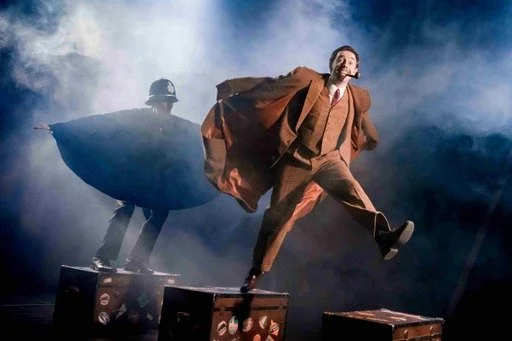RATTIGAN'S 'TABLE No 7' AT THE ARTS THEATRE
Angela Jones Jeremy Newmark Jones Siân Phillips Alexandra Dowling Simon Coates and Pamela Miles
Anyone who has studied at Cambridge University , statistical data analysis confirms, will mention the fact within 40 seconds of talking to a new acquaintance. Or Oxford of course. Snobbery and elitism reveal the worst of human nature - and the most pitiable.
Terence Rattigan’s superbly set play shows us how.
Siân Phillips as Mrs Railton Bell
As the curtain goes up on Separate Tables, the dining room with its breezy seaside set seems the quintessence of English decorum : in a boarding house where the residents follow the rigorous rules – courtesy, manners and civility. Terence Rattigan presses on to unpick the pleasantries and expose the real truth behind the restraint. His elegant dialogue and light humour conceals a far deeper motive - to unmask the fears and repressions of an entire post-war class. Rattigan rips the veil of gentility from the deeply troubled cast of middle-class repression.
Last night’s audience saw film and theatre star Siân Phillips play Mrs. Railton -Bell an upper-class matriarch. She dominates the dining room with confident flair Siân Phillips’ famous voice is imperious and not to be challenged. Her sad submissive daughter Sybil, Alexandra Dowling, great in this role , is a nervous servant with no will of her own, hardly allowed to speak as her mother holds forth. Her fellow residents, Pamela Miles as Lady Matheson and Richenda Carey as a flighty Miss Meacham ( wonderfully executed roles ) are under her thumb.
The atmosphere sparkles with superficial light badinage – a couple with a new baby the Strattons are the only young people – and disapproved of by Mrs. Railton-Bell for failing to dress for dinner. But when one of the company, the already suspect Major Pollock (his war tales and school stories fail to add up) falls foul of the law, they are horrified. There is some dissension but Mrs. Railton Bell takes the lead in demanding his exposure and banishment.
Sex is secretly at the centre of the action – written in a time when homosexuality was a criminal act. Early productions of the play switched the Major’s taboo activity from soliciting men to fondling young women in the local cinema and forced Terence Rattigan to change the script: he remarked to his audience of the Lord Chancellor’s censorship ‘We shall foil him”’ But it wasn’t until later in the 50s the original script was restored.
This is a play packed with humiliation. Lives reduced and ruined by brutal conformist rules, come alive in the hands of this once revered writer. It is Nathaniel Parker as fake Major Pollock who carries the pain of the persecution. His performance was skilful human and heartbreaking. As the momentum mounts his isolation becomes more poignant and as the play takes an unexpected turn, this actor takes us with him. The expertly written denouement had many of us in silent tears for the suffering a savage society can mete out. The hotelier herself remarks, how surprising it is to live ‘when you give up hope’. Mercifully there is hope here -in the bitter end.
Siân Phillips and Alexandra Dowling









